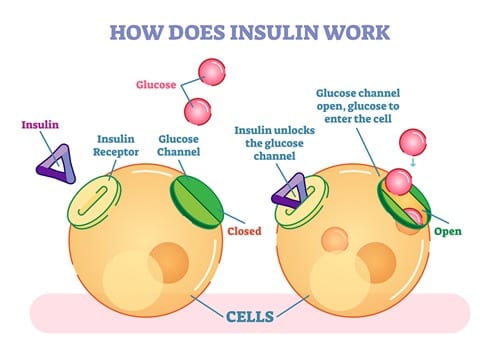Medical Weight Loss
The medical weight loss program is comprised of specialists who have training and expertise in the field of weight loss. Whether your goal is to lose weight for cosmetic reasons or you are suffering from poor health due to obesity, you will find AMOWC is dedicated to helping you lose weight, live longer and be healthier. The specialists involved in our medical weight loss program use the latest techniques available in the field.
Each patient who visits AMOWC is treated as a unique individual and receives a customized weight loss program with personal counseling and careful monitoring to best achieve short-term and long-term goals. Although our primary goal is to help you reach your weight loss target quickly and easily, the focus of care is to allow you to maintain your weight loss permanently so that you will not put the weight back on after you complete your program.
If you are serious about losing weight, you will find the specialists at AMOWC to be experts in the subjects of obesity, nutrition, fitness, prescription medication, exercise, behavioral motivation, weight loss counseling and weight related illness.
What Causes Weight Gain & Obesity?
Declining hormone levels, food allergies, toxin build-up, lack of exercise, inflammation in the gut, nutritional deficiencies, incorrect eating, including those 500-calorie per day diets with prescription drugs, and thyroid issues are all symptoms of weight gain and obesity.
At AMOWC, we do a complete test to identify the underlying problems of your weight gain and then correct them. We will teach you how to eat food properly and thus turn on your “fat burning furnace”. You should never starve to lose weight. Just a 30-minute complimentary consult will convince you of our system and our ability to get that body back to the way it used to be.
If you are tired of the yo-yo dieting and want to optimize yourself, call 813-341-2600 for a complimentary consult.
Energy balance means that your energy IN equals your energy OUT. To maintain a healthy weight, your energy IN and OUT do not have to balance exactly every day. It’s the balance over time that helps you maintain a healthy weight.
If your hormones are not optimized, your body is deficient in nutrients, you have toxins in your gut from food allergies, medications, metals, plastics, etc. and you are not eating correctly, you WILL always gain your weight back and then some!
Let us optimize your body and help get you to your optimal weight safe and easy.
Prescription diet pills, which are all the rave, cause serious blood and heart conditions while affecting your nervous system.
- WEIGHT STAYS THE SAME = Over time same amount of energy IN and energy OUT
- WEIGHT GAIN = Over time less IN than OUT
- WEIGHT LOSS = Over time more OUT than IN
People who are inactive are more likely to experience weight gain because they do not burn up the calories that they take in from food and drinks. An inactive lifestyle also raises your risk for heart disease, high blood pressure, diabetes, colon cancer, and other health problems. Overweight and obesity happen over time when you take in more calories than you use.
Our environment does not always help with healthy lifestyle habits; in fact, it encourages obesity. Some reasons include:
- Lack of neighborhood sidewalks and safe places for recreation. Not having area parks, trails, sidewalks, and affordable gyms makes it hard for people to be physically active.
- Work schedules. People often say that they do not have time to be physically active given the long hours at work and the time spent commuting back and forth to work.
- Over-sized food portions. Americans are surrounded by huge food portions in restaurants, fast food places, gas stations, movie theaters, supermarkets, and even at home. Some of these meals and snacks can feed two or more people. Eating large portions means too much energy IN. Over time, this will cause weight gain if it isn’t balanced with physical activity.
- Lack of access to healthy foods. Some people do not live in neighborhoods that have supermarkets that sell healthy foods such as fresh fruits and vegetables. Or if they do, these items are often too expensive for them to buy.
- Food advertising. Americans are surrounded by ads from food companies. Often children are the targets of advertising for high-calorie, high-fat snacks and sugary drinks. The goal of these ads is to sway people to buy these high-calorie foods, and often they do.
- Genes and Family History
Studies of identical twins that have been raised apart show that genes have a strong influence on one’s weight. Overweight and obesity tend to run in families. Your chances of being overweight are greater if one or both of your parents are overweight or obese. Your genes also may affect the amount of fat you store in your body and where on your body you carry the excess fat.
Sometimes hormone problems cause overweight and obesity and can make weight loss seem impossible. These problems include:
- Underactive thyroid is also called hypothyroidism. This is a condition in which the thyroid gland does not make enough thyroid hormone, commonly referred to as TSH, T3 and T4. Lack of thyroid hormone will slow down your metabolism and cause weight gain. You’ll also feel tired and weak.
- Cushing’s Syndrome is a condition in which the body’s adrenal glands make too much of the hormone cortisol. Cushing’s Syndrome also can happen when people take high levels of medicines such as prednisone for long periods of time. They gain weight, have upper-body obesity, a rounded face, fat around the neck, and thin arms and legs.
- Polycystic Ovarian Syndrome (PCOS) is a condition that affects about 5 to 10 percent of women of childbearing age. Women with PCOS often are obese, have excess hair growth, and have reproductive and other health problems due to high levels of hormones called androgens.
Certain medicines such as corticosteroids such as prednisone, antidepressants such as Elavil®, and medicines for seizures such as Neurontin® may cause you to gain weight. These medicines can slow the rate at which your body burns calories, increase your appetite, or cause your body to hold on to extra water—all of which can lead to weight gain.
As you get older, you tend to lose muscle, especially if you’re less active. Muscle loss can slow down the rate at which your body burns calories. If you do not reduce your calorie intake as you get older, you may gain weight. Midlife weight gain in women is mainly due to aging and lifestyle, but menopause also plays a role. Many women gain around 5 pounds during menopause and have more fat around the waist than they did before. Ask AMOWC about our hormone replacement therapy for both men and women.
Our Weight Loss Program
Eating correct food and exercise are the key factors to weight management 70% of the time. However, nutritional deficiencies, hormone issues, food allergies, sleep, and toxin build-up can also play a major role in weight loss and metabolism. We look at all these aspects, do the correct testing and create a premium customized plan to achieve your ideal goals & body weight. Without a comprehensive plan you are basically trying several different things while waiting to see if it finally works. We get right to the root of the issues, correct them and educate you on how to maintain your new lifestyle.
Maintenance is what weight loss is all about. It is a lifestyle change, not a diet or diet mentality. In fact, AMOWC stresses that the weight loss program is also an ongoing educational process. Rebound weight will not happen when you approach your weight loss properly and we intend to show you how easy it is.
“When you first come to our center, you already know how to eat too much. During the dieting period, you learn how to eat properly; and with maintenance, we will show you how to eat just enough.”
Obviously, this process works: over 85% of our patients keep their new slim weight. This is an astounding statistic compared to the 5% success rate of other diet programs worldwide. And it is an easier process than you might think.

Our 9 Tenets of Weight Loss

The 9 tenets that AMOWC highly recommends in order to maintain ideal health and weight stabilization:
- Hormone and/or HGH Optimization
- Testing for food allergies
- Testing for nutritional deficiencies
- Proper exercise
- Nutritional sound food
- Detoxification
- Quality supplementation
- Sleep
- Education and/or positive attitude
The 9 Tenets of Weight Loss Explained
Hormones must be balanced between female estrogens and progesterone, male androgens such as testosterone, and non-sex hormones for proper thyroid function, adrenal support and to optimize the general health of individuals trying to achieve their weight loss goals.
- Hypothyroidism occurs when the thyroid gland does not produce enough “energy-generating” thyroid hormones,T3, T4, TSH. Weight gain is a classic symptom of this dysfunction.
- One of the functions of cortisol is to trigger a glucocorticoid effect—helping the body produce blood sugar from proteins. Excess glucose is then used for lipogenesis (fat production). Research has linked over-secretion of cortisol with obesity and increased fat storage in the body.
- Having high levels of insulin can be a good indicator of insulin resistance, which is common in obese individuals. Maintaining stable blood sugar levels is one of the many ways to help stabilize your insulin levels. Having high levels of insulin is a major factor in weight gain.
- Illness and aging can lead to development of a testosterone deficiency in adult males. The first signs are a decline in mental and physical performance as well as psychological symptoms: depression, anxiety, irritability, difficulty concentrating.
- Symptoms for human growth hormone (HGH) deficiency include fatigue, lack of energy, poor sleep, decreased exercise capacity and psychological problems. Signs include decreased lean body mass, increased visceral fat, decreased muscle strength and bone density, and increased lipids.
DHEA which is produced by the adrenal gland and drops after 30 years of age, fights cortisol and helps with obesity.
If you have a food allergy or intolerance, this will slow down the ability to metabolize fats due to blockage & congestion and can make weight loss seem impossible.
An allergic reaction to food may cause the body to retain as much as 4 percent of its body weight in edema fluid (water fluid).
Hypoglycemia (low blood sugar) is another clinical symptom linked with food allergy, and usually occurs 2-6 hours after ingesting the offending food allergen.
Certain medications such as beta-blockers, statins, antibiotics, benzos, and anti-depressants deplete vital vitamins and nutrients from the body that are necessary components for efficient carbohydrate metabolism. This can eventually lead to weight gain.
Having high levels of free radicals within the body destroys the mitochondria, which is the housing for energy production. Free radicals destroying the mitochondria slow down carbohydrate metabolism. Having your essential micronutrients tested can help correct any imbalances that can lead to unwanted weight gain.
- The more muscle you have the more calories you will burn at rest.
- Regular exercise makes the body more sensitive to insulin.
- Exercise boosts the “feel good hormone” dopamine.
- Exercise, diet, and cardio is the best trio for weight loss — given you are hormonally sound.
- Being in shape boosts confidence, physical appeal, mental acuity, and overall protects you from future complications.
- Get all protein sources from complete proteins e.g. chicken, beef, fish.
- Cow milk is high in casein, low in whey. Mother’s milk is high in whey, low in casein. Goat milk is closest to mother’s milk, which is optimal in avoiding bloating, cramps, gas, etc.
- Eat breakfast; if you do not, you’ll gain weight. Insulin is highest in the morning, waiting to soak up those vital nutrients from the foods to help make you more productive during the day. Skipping breakfast leads to sluggishness and loss of motivation early in the day. You increase your rate of weight gain by 45% if you skip breakfast!
- Increase fiber intake; it gives one satiety (fullness). A decrease in caloric intake by 10% can occur by adding 14 grams of fiber a day.
- Eating too low of calories boosts cortisol, body will start storing fat due to a fight or flight response, in return you will gain adipose tissue (stomach fat).
- Avoid fast food’s hidden sugars especially in the new “diet” menus.
- Do not eat carbohydrates alone.
Detoxification is highly recommended prior to a weight loss program to get rid of toxins and residue from refined/processed foods. Toxic cleansing includes colon cleansing, parasite cleansing, kidney cleansing, and liver cleansing, providing a solid foundation. Detox can save your body from requiring drastic solutions such as surgery, radiation, or chemotherapy. Following a body cleansing and detoxification plan and using natural cures whenever possible, will help you live a longer and healthier life & help promote weight loss.
- Herbal and green tea are great sources of antioxidants.
- Fish oil is great for warding off inflammation. Obesity is a type of inflammatory response in the body.
- Digestive enzymes help break down foods.
- CLA (conjugated linoleic acid) helps insulin work more efficiently. It can break plateaus in your weight loss regimen.
- Carnitine has the same effects as CLA. It burns fat and helps with plateaus in weight loss.
Proper sleep is required for recovery and rejuvenation. Proper sleep means a regular bedtime before 11:00 pm and 7-8 hours of restful sleep. The body releases its largest pulse of Growth Hormone between the first 1-2 hours of sleep.
- Counseling patients about the advantages of weight loss.
- Unhealthy weight gain can lead to serious health implications.
- Maintaining healthy weight is a life style change.
- Setting realistic and individualized goals for weight loss.
- Behavior therapy: Assessing the patient’s motivation and readiness to implement the medical weight loss therapy, providing continual encouragement.
- Combined therapy: Incorporating a regimen that combines well-balanced diets, increased physical activity and behavior therapy.
- Reinforcing the importance of maintaining a healthy weight.
- Once initial weight loss is achieved, patients are counseled to continue their diet and exercise regiments to maintain their new healthy weight.
- Setting up long term goals and mentoring in maintenance phase.
Detoxification of Your GI Tract

There are a number of dietary toxins that can accumulate in your system. One way to get rid of these unwanted substances is detoxification of your GI tract. Blame it on that fatty slice of pork you had for dinner or your daily consumption of junk foods for snacks. Simply put, improper diet and unnutritious food are the root causes of dietary toxins in your body.
There are several body components that help in eliminating dietary toxins, a process known as detoxification. The gastrointestinal tract, shortly termed as the GI tract, is a vital organ in the detoxification process. The GI tract itself is further subdivided into two segments, the lower and upper gastrointestinal tract. The mouth, esophagus, pharynx and the stomach are the organs that make up the upper GI tract. These are the main organs where food is initially processed. The lower GI tract consists of the intestines and your anus. Your small intestine is further subdivided into three parts namely the ileum, jejunum and duodenum. The large intestine also consists of three main organs, the caecum, colon and the rectum. The lower GI tract is basically responsible for the digestion and excretion of your body wastes. Other excretory organs, including the liver, pancreas and kidneys also aid in detoxification.
When your GI tract cannot perform its functions properly, toxic waste builds up in your body. It then becomes necessary to detoxify and cleanse your GI tract from these toxins. There may be times when cysts, adenomas or polyps breed in your organs, detoxification of your GI tract would help in removing these unwanted components. Detox cleansing also helps in healing lesions, ulcerations and other tissue problems in your system. It also maintains the tone and the shape of your intestines. Detoxification of your GI tract is responsible in keeping things normal and balance by regularizing PH and eliminating harmful bacteria like candida and other harmful yeasts.
There are a lot of ways where you can detoxify your GI tract. The best technique of detoxifying your GI tract lies in proper diet and knowing which foods to eat. Some people would also find it beneficial to take in probiotics supplements to aide in the propagation of good bacteria in the intestine to aide in better digestion.
There are a number of medicinal herbs that aide in the detoxification of your GI tract, one of which is dandelion roots. They now come in form of teas. Dandelion roots contain insulin that is need by bifidobacteria, a good bacterium that thrives on the intestines. Dandelion roots are found to be very efficient in detoxification through strengthening and cleansing the liver and GI tract.
Detoxification of your GI tract needs to begin with a detox diet. You can take in fruit juices, vegetable drinks and broths and herbals teas. Drinking plenty of liquid is always beneficial. Cut down on the meat and grains. Fruits and vegetables should always be a part of your meal. A detox diet may also include the intake of some herbs, psyllium and bentonite. These are known to be effective substances in helping the detoxification of your GI tract. Planning your diet, along with taking in the treatment, can be a little tricky. You actually need to pass a PH test and your detox diet should also be planned according to your weight. It would be best to get a medical expert to assist you in your detox diet.
You should always see to it that every part of your body is well maintained. The excretory and digestive components of your body need regular detoxification to ensure that your body functions are all normal. Removing dietary toxins is very vital in keeping your body healthier and livelier. Get started with detoxifying your GI tract today, and see for yourself the difference it can do.
Insulin Resistance
If you have pre-diabetes or diabetes, chances are that you’ve heard of the medical term insulin resistance syndrome or metabolic syndrome. Insulin resistance or metabolic syndrome describes a combination of health problems that have a common link — an increased risk of early heart disease. The cluster of medical conditions that make up the insulin resistance syndrome or metabolic syndrome places a person at risk of developing type 2 diabetes and atherosclerosis (hardening of the arteries). It is estimated that 70 to 80 million Americans have the combination of diseases caused by insulin resistance or metabolic syndrome.
Diseases caused by insulin resistance include the following:
- Obesity
- Type 2 diabetes
- High blood pressure
- Abnormal cholesterol levels
- Heart disease
- Polycystic Ovarian Syndrome (PCOS)

What Is Insulin Resistance?
Normally, food is absorbed into the bloodstream in the form of sugars such as glucose and other basic substances. The increase in sugar in the bloodstream signals the pancreas (an organ located behind the stomach) to increase the secretion of a hormone called insulin. This hormone attaches to cells, removing sugar from the bloodstream so that it can be used for energy.
In insulin resistance, the body’s cells have a diminished ability to respond to the action of the insulin hormone. To compensate for the insulin resistance, the pancreas secretes more insulin.
People with this syndrome have insulin resistance and high levels of insulin in the blood as a marker of the disease rather than a cause. Over time people with insulin resistance can develop high sugars or diabetes as the high insulin levels can no longer compensate for elevated sugars.
What Are The Health Components of Insulin Resistance Syndrome?
The health components of insulin resistance syndrome include:
- Impaired fasting blood sugar, impaired glucose tolerance or type 2 diabetes. This occurs because the pancreas is unable to turn out enough insulin to overcome the insulin resistance. Blood sugar levels rise and diabetes is diagnosed.
- High blood pressure. The mechanism is unclear, but studies suggest that the worse the blood pressure, the worse the insulin resistance.
- Abnormal cholesterol levels. The typical cholesterol levels of a person with insulin resistance are low HDL, or good cholesterol, and high levels of another blood fat called triglycerides.
- Heart disease. The insulin resistance syndrome can result in atherosclerosis (hardening of the arteries) and an increased risk of blood clots.
- Obesity. A major factor in the development of insulin resistance syndrome is obesity — especially abdominal obesity or belly fat. Obesity promotes insulin resistance and negatively impacts insulin responsiveness in a person. Weight loss can improve the body’s ability to recognize and use insulin appropriately.
- Kidney damage. Protein in the urine is a sign that kidney damage has occurred, although not everyone uses this component to define insulin resistant syndrome. Insulin Resistance and Diabetes
How Is Insulin Resistance Syndrome Diagnosed?
There is no simple test to diagnose insulin resistance syndrome. Rather, your doctor may suspect the syndrome if you have the following health risk factors:
- More than one parent or sibling who has type 2 diabetes, high blood pressure, or cardiovascular disease.
- Obesity or overweight (BMI — body mass index — above 25).
- More fat around the waist than around the hips (an apple shape).
- Age greater than 40 years
- Gestational diabetes when pregnant.
- A history of a condition called polycystic ovarian syndrome (PCOS).
- Pre-diabetes.
- Are a member of certain ethnic groups (Latino, Blacks, or Native American).
The current epidemic of obesity in children also puts them at risk for the development of the insulin resistance syndrome.

Prescription Medications for Insulin Resistance Syndrome
Specific prescribed medications such as Glucophage (metformin), Actos (pioglitazone) and Avandia (rosiglitazone) are all approved to treat the insulin resistance that occurs with type 2 diabetes. These drugs make your body more sensitive to the actions of insulin. Multiple drugs, such as cholesterol-lowering drugs or anti-hypertensive drugs are usually necessary to treat the different conditions that are part of the insulin resistance syndrome.
Insulin Resistance Syndrome Prevention
If you live a healthy lifestyle, you may be able to avoid getting insulin resistance syndrome and the associated diseases. Here are some tips to prevent insulin resistance or metabolic syndrome:
- Exercise. Try walking 30 minutes a day for at least 5 days a week. Exercise can be divided into 3 separate periods of 10 minutes each.
- Maintain a healthy weight.
- Eat right. A healthy balanced and caloric restricted diet is recommended.
10 Key Facts About Our Medical Weight Loss Program
Fact 1
When you have reached your goal, you can stay there for life. We will arm you with the knowledge and techniques to be able to keep the excess weight off permanently. You will not experience rebound weight gain.
Fact 2
Expect to live an extra 10 years or so. Maintaining your goal weight is critical in preventing stroke, heart attacks, certain forms of cancer, hypertension, lowered pulse rate, cleaner arteries and veins, and improving cholesterol levels and blood sugar thus, reducing or eliminating fatigue and food cravings.
Fact 3
Cravings are gone. Cravings are created by an unbalanced diet and unstable blood sugar levels. By learning how to eat sensibly – cravings and abnormal hunger become a non-issue.
Fact 4
Eat what you like and stop worrying about dieting all the time. Maintenance signifies that moderation prevails. Your strict dieting days are over. They have been replaced with a plentiful and delicious menu of healthy and wholesome foods.
Fact 5
You will look younger. So many of our patients who have lost 25 to 40 pounds, and more, routinely hear they look 10 years younger. You can look forward to years of nice skin tone that is notably healthy and retains its elasticity.
Fact 6
Finally – be the object of someone else’s fantasies. You may find some very pleasant side effects of maintaining your weight, particularly regarding romance, sexuality and emotional involvement. Medically speaking, these side effects include cleaner veins and arteries and improved blood supply that help many patients with improved sexual function and general well-being well into old age.
Fact 7
That slim fitting item in the store has your name on it. Really. Those troublesome inches around the thighs, buttocks and waist will stay off. And as you continue your new way of caring for your body, you will find it allows you to consider fashions that you did not think were possible.
Fact 8
You will have energy to do things you never thought possible. Maintenance takes into account a full and exciting life that requires lots of energy and places no limits on sporting and physical activity. Your ongoing food intake contains all the protein and nutrients that you will ever need.
Fact 9
We will always be here for you. We are aware that there are numerous reasons why, over time, it is possible to put some weight back on such as demanding careers, stressful lifestyles and convenient fast foods. We would much rather help you take off 5 to 15 pounds now than 20 or 40 pounds later.
Fact 10
We will always be here for you. We are aware that there are numerous reasons why, over time, it is possible to put some weight back on such as demanding careers, stressful lifestyles and convenient fast foods. We would much rather help you take off 5 to 15 pounds now than 20 or 40 pounds later.
We have developed maintenance plans and want you to feel comfortable about coming in when all you really need is a minor ‘tune-up’. You are not on your own and we will take care of it in a matter of weeks. Our specialists will create a carefully designed food plan that will allow you to reach your weight loss goal.
For the first week or two, additional adjustments of food may be necessary. In time, we find what certain foods cause you to gain weight. It does not mean you cannot ever eat that food, but you will have to change your portions and preparation methods. Everybody’s calorie requirements will be different. The process involves reintroducing foods to find out how many calories you can burn and not gain weight.
Remember, people metabolize different foods differently. Too many carbohydrates may be the cause of your weight gain. Other people may not be able to metabolize dairy fats efficiently. We determine which foods work for you and which trigger weight gain. Of course, you are probably anxious to try some foods not previously allowed on other diets. You can now have more variety in carefully measured portions.
